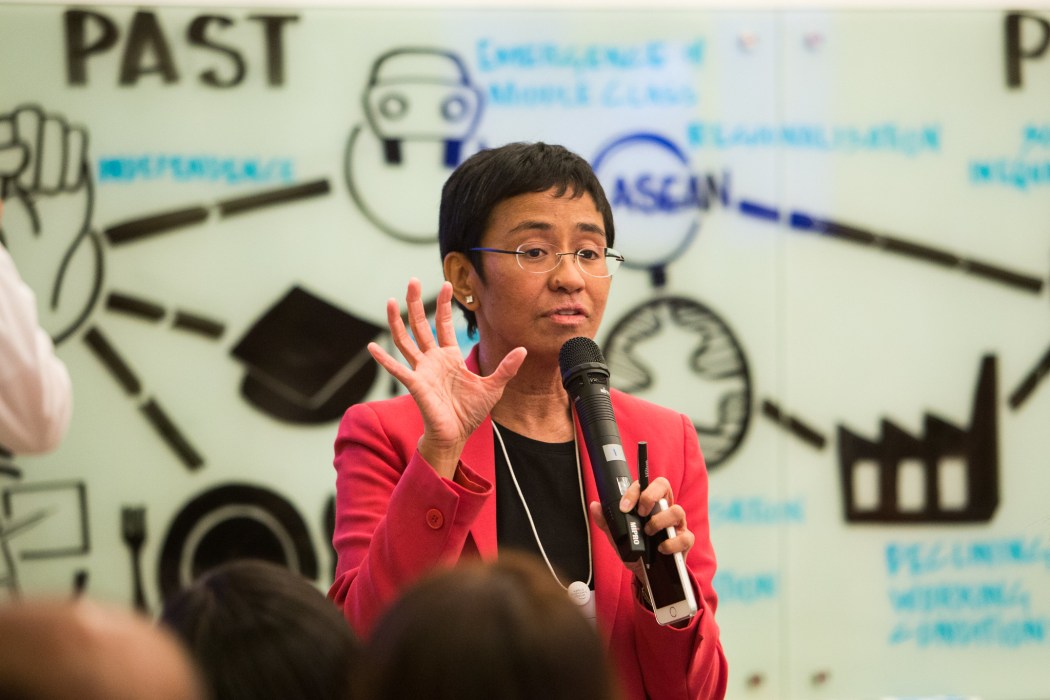The Nobel Peace Prize was on Friday awarded to journalists Maria Ressa of the Philippines and Dmitry Muratov of Russia for their fight for freedom of expression in their countries.
The pair were honoured “for their efforts to safeguard freedom of expression, which is a precondition for democracy and lasting peace,” the chairwoman of the Norwegian Nobel Committee, Berit Reiss-Andersen, said.

“They are representatives of all journalists who stand up for this ideal in a world in which democracy and freedom of the press face increasingly adverse conditions,” she said.
In 2012, Ressa, 58, co-founded Rappler, a digital media company for investigative journalism, which she still heads.
Who is Maria Ressa? Click to view.
Veteran Philippine journalist Maria Ressa, who was awarded the Nobel Peace Prize on Friday, has become a symbol of the fight for press freedom in an era of strongmen leaders.
The former CNN bureau chief set up news website Rappler in 2012, bringing together multimedia reporting and social media to offer an edgy take on Philippine current events and a critical eye on the government of President Rodrigo Duterte.
Ressa and Rappler have faced multiple criminal charges and investigations after publishing stories critical of the firebrand leader and his bloody drug war.
She had already been named a Time Person of the Year in 2018 for her work on press freedom, but the arrests further grew her international profile and drew more attention to her case.
Her reporting has unleashed what media advocates say is a grinding series of criminal charges, two arrests and a deluge of online threats against her and Rappler.
The website has had to fight for survival as Duterte’s government has accused it of violating a constitutional ban on foreign ownership in securing funding, as well as libel and tax evasion.
Duterte has attacked Rappler by name, calling it a “fake news outlet”, over a story about one of his closest aides.
Though the government has said that it has nothing to do with any of the cases against her, press freedom advocates disagree.
Yet through the campaign against her Ressa, 58, has remained based in the Philippines and continued to speak out against Duterte’s government despite the risks.
“I’m not a sole reporter,” Ressa told AFP in an interview last year. “My job is to hold up the ceiling, it has been for a while… so that our folks can continue working.”
‘Shot at and threatened’
The most recent case saw a second libel charge against Ressa dismissed in August. Another libel charge against her was dismissed in June.
Ressa’s position at the head of the Rappler news site meant getting, by her own estimate, up to 90 abusive messages per hour online at one point toward the end of 2016.
The threats came in the months after Duterte took power and launched his narcotics crackdown that has killed thousands.
Rappler was among the domestic and foreign outlets that published shocking images of the killings and questioned its legal basis.
But Ressa’s arrests wouldn’t come until early 2019.
The first was in February and was over the libel case, then a second one less than two months later on allegations Rappler violated laws barring foreign ownership of media.
Due to the string of libel and tax cases against her and Rappler, Ressa says she had to post bail eight times in the span of about three months.
It was an entirely new set of threats for Ressa, who was a veteran of conflict zones before co-founding Rappler.
“I began as a reporter in 1986 and I have worked in so many countries around the world, I have been shot at and threatened but never this kind of death by a thousand cuts,” Ressa said.
As CNN’s former bureau chief in Manila and Jakarta, Ressa specialised in terrorism where she tracked the links between global networks like Al-Qaeda and militants in Southeast Asia.
The Princeton graduate, who holds both American and Philippine citizenship, later returned to the Philippines to serve as news chief at the nation’s top broadcaster ABS-CBN.
Rappler has “focused critical attention on the Duterte regime’s controversial, murderous anti-drug campaign,” Reiss-Andersen said.
Muratov, 59, has meanwhile defended freedom of speech in Russia for decades, under increasingly challenging conditions.
In 1993, he was one of the founders of the independent newspaper Novaya Gazeta, which has a “fundamentally critical attitude towards power” the committee said, and has been its editor-in-chief since 1995.
“Without freedom of expression and freedom of the press, it will be difficult to successfully promote fraternity between nations, disarmament and a better world order to succeed in our time,” Reiss-Andersen said.
Support HKFP | Policies & Ethics | Error/typo? | Contact Us | Newsletter | Transparency & Annual Report | Apps
Help safeguard press freedom & keep HKFP free for all readers by supporting our team

LATEST FROM HKFP
HKFP has an impartial stance, transparent funding, and balanced coverage guided by an Ethics Code and Corrections Policy.
Support press freedom & help us surpass 1,000 monthly Patrons: 100% independent, governed by an ethics code & not-for-profit.










